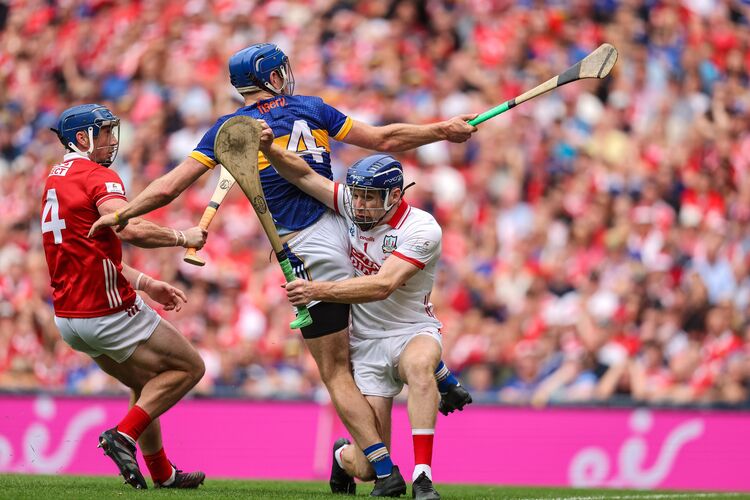General Eisenhower speaking on June 5, 1944, with men of the 502nd Parachute Infantry Regiment, part of the 101st Airborne Division, ahead of the Normandy landings the next day. LIBRARY OF CONGRESS
By Peter McDermott
pmcdermott@irishecho.com
Everybody who served in the Oval Office as commander-in-chief of the armed forces from January 1953 through January 1993 had worn a uniform during World War II.
Add to that the two decades that Franklin Roosevelt and Harry S. Truman held office, and that makes 60 continuous years of U.S. presidents with a military link to the bloodiest conflict in mankind’s history.
Even to forget this defining episode for America seems a betrayal. But that is precisely what is happening, as the generation that fought it slips into history
America’s wartime idealism is worth a look again when much of the GOP establishment and the party’s intelligentsia have watched in horror as someone they clearly regard as a racist and an uncouth demagogue becomes the party’s standard-bearer in this year’s presidential election.
They’re called the “Greatest Generation” (journalist Tom Brokaw coined the term), even if General Dwight D. Eisenhower, the supreme commander of Allied Forces in Europe, was 34 years older than both George H.W. Bush and Jimmy Carter. Bush’s heroics as a pilot in war-time Europe are storied, while Carter, who joined the U.S. Naval Academy in 1943, is rather better known for his post-war service on a nuclear submarine.
Ronald Reagan, the star of “Knute Rockne, All American,” had been in the army reserve since 1938, but when war came his poor eyesight ruled him out of front-line service. Reagan was attached to the Army Air Force’s First Motion Picture Unit for much of the war and was the only one of the nine presidents from 1945-1993 who’d never served overseas with the armed forces.
Richard Nixon could have claimed exemption as a birthright Quaker, but after being employed for a time with the Office of Price Administration in Washington, he enlisted in the navy. Soon the lawyer from Whittier, Calif., was commissioned as a lieutenant and eventually he’d spend 13½ months at posts on the Solomon Islands in the South Pacific. He wasn’t too far away on Aug. 1, 1943, when his 1960 opponent, John F. Kennedy, was involved in the PT 109 incident that helped give him a national profile.
Other than one nighttime shelling incident, Nixon was not in the line of fire. However, he did witness the horrors of war – helping on one occasion, for instance, to clear bodies after a B-29 exploded on a runway. “I can still see the wedding ring on the charred hand of one the crewmen when I carried his body from the twisted wreckage,” he recalled later.
During his free time, Nixon displayed considerable skill at the poker table by winning large sums of money from his fellow officers. The 37th president also read widely, and wrote a daily letter to his wife, Pat.
The units that Nixon commanded, “were the classic, almost Hollywood-cast cross section of the navy, young men from New York slums and the Midwest, one from a wealthy family in the South, a Mexican, an Indian, an Italian, and the evitable Texan,” according to biographer Roger Morris.
“Nixon was continually impressed with their variety and contrasts in writing home about his experiences and in talking about them long afterwards,” Morris adds.
Zeros attack
Lyndon Johnson was a 33-year-old congressman and a lieutenant commander in the U.S. Naval Reserve when the Japanese attacked Pearl Harbor. In June 1942, President Roosevelt tapped LBJ to lead a team of three observers – the other two being career officers – that would report back to him about conditions in the Southwest Pacific.
Robert Caro’s multi-volume classic “The Years of Lyndon Johnson” reveals his subject to be physically a coward, at least in the view of those who went to high school and college with him in Texas. LBJ avoided wrestling and fistfights and “displayed a conspicuous timidity and hesitancy…at riding an unruly horse or diving from a not very high bank into the Pedernales River,” he reports.
All the more surprising for Caro, then, that during the trip for FDR, he volunteered for a bombing mission to be conducted by a dozen B-26 Marauders to Lae in Papau New Guinea. Assigned to a plane called the “Wabash Cannonball,” he put his movie camera under the seat and then took a trip to the bathroom. But by the time he returned to the plane, one of his fellow observers, Lt. Col. George Stevens, had taken his place. The tall congressman, instead, found crouching room on the “Heckling Hare.”
On the way to the mission’s target, that plane came under sustained attack from a team of Japanese Zeros. Throughout the 18-minute engagement, LBJ remained completely calm while peering out at the attackers. The “Heckling Hare” was hit repeatedly by Zero bullets, but survived thanks to its pilot Lt. Walter Greer’s skill.
Another 10 planes made it back to home base after dropping their bombs on Lae’s airfield; the “Wabash Cannonball,” however, was downed by Zero fire, disintegrating when it hit the ocean. Its crew and Stevens (and Johnson’s camera) were lost.
LBJ later had to face a dressing down from General Douglas MacArthur who told the young pol that as a member of the navy he hadn’t been required to risk his life on an air force mission. The essence of Johnson’s response was remembered by the other observer, Lt. Col. Samuel Anderson: “Many of the airmen knew that he was a congressman from Texas—that many were his constituents—and he wanted to show them that he could face the same dangers they had to face.”
While Stevens was posthumously awarded the Congressional Medal of Honor, Johnson and Anderson were both given the Silver Star. Caro pointedly notes that the pilot Greer got nothing.
PR genius
It was Johnson’s last chance to get a war record for home consumption. In July, President Roosevelt ordered politicians to choose either Congress or the military. Four resigned their seats, while LBJ and three others left active service. Thereafter, the future 36th president never lost an opportunity to talk about his experiences on the “Heckling Hare” and his often absurdly exaggerated accounts of the FDR-ordered mission generally were in later years the cause of some eye-rolling by members of his staff and the press.
Kennedy didn’t need to tell anyone about his wartime brush with death. His father, a public-relations genius, had the New Yorker magazine and Reader’s Digest do that. (William Doyle, author of “PT 109: An American Epic of War, Survival, and the Destiny of John F. Kennedy,” engagingly retold that story and many others at an Irish Arts Center event on June 7. https://www.irishecho.com/2016/06/epic-adventure-on-road-to-oval-office/)
Gerald Ford, who was JFK’s senior by four years, served on board the newly-built aircraft carrier USS “Monterey” in the Pacific Theater from June 1943 through December 1944.
Ford, who was elected to Congress in 1948 for Michigan’s 5th District and was the most recent president or vice president to die (Dec. 26, 2006), now seems to be from a very different time.
Prominent Republican strategist Mike Murphy has said that Donald Trump, his party’s presumptive nominee for 2016, isn’t quite a fascist, but he has “fascist tendencies.” Just a few months ago, it was taboo for the sober-minded to discuss fascism and attempt to define it in the context of contemporary American politics. Not anymore, clearly.
Through the 1930s – the decade that Nixon, Ford and JFK came of age – Americans were very reluctant to become embroiled in another European conflict, even if most were appalled at the ranting demagogues who’d taken power on the continent. But, attitudes were changing by the time of the fall of France to the Nazis in 1940. A Woodrow Wilson phrase from the earlier war – “civilization itself seeming to be in the balance” – felt more real than abstract.
The Greatest Generation subsequently helped make the new Europe, and in the decades since the U.S. has always made it clear that it strongly supports its closest ally Britain’s involvement in a political and economic union with its neighbors.
Enter Donald Trump, just hours after the Brexit vote, tweeting his joy from Scotland that people were taking back their country. Let’s leave aside that his mother’s Scotland had voted 62 to 38 percent to remain in the EU; he might have been confused. But a normal candidate – a Mitt Romney, say, or a Marco Rubio – would know enough to hew close enough to the official line or to acknowledge it. Trump, though, as Murphy has said, “doesn’t know what he doesn’t know, and he doesn’t know very much.”
It seems that he just doesn’t care, either.







